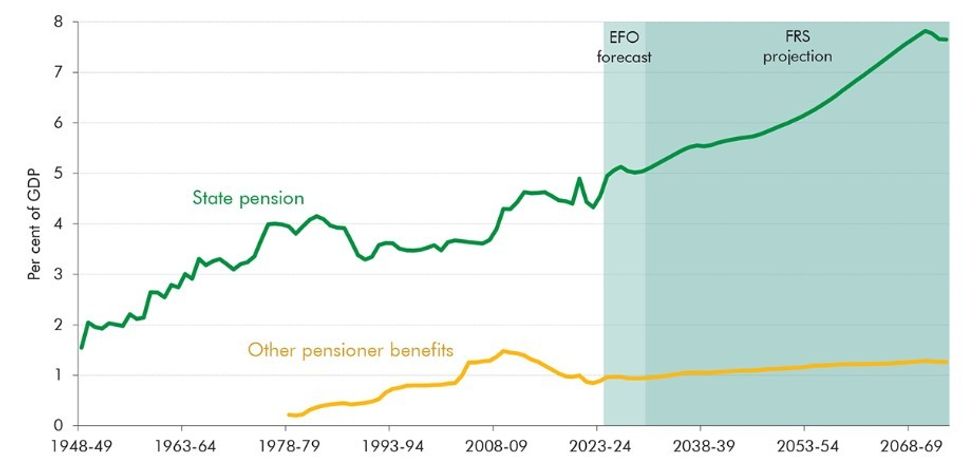State pension age increase 'point of discussion' as DWP launches review into retirement benefit's future

The state pension age is scheduled to jump to 67 from next year for thousands of Britons
Don't Miss
Most Read
The future of the state pension is becoming a "point of discussion" in light of new figures from the Office for National Statistics (ONS), experts claim.
Last month, the Department for Work and Pensions (DWP) launched a review into the state pension age amid concerns over the long-term viability of the triple lock and the benefit's affordability.
Britain's centenarian population has surged to 16,140 individuals in 2023, representing a dramatic increase of more than 100 per cent compared to two decades earlier, based on data published in March.
The figures reveal that while the number of people reaching their hundredth birthday has plateaued recently, remaining virtually unchanged from 2022's count of 16,200, the long-term trajectory shows remarkable growth from just over 8,000 centenarians recorded in 2003.

The state pension age could be increased sooner-than-expected
|GETTY
This demographic shift forms part of a broader pattern, with the total number of people aged 90 and above now standing at 611,719 across the UK.
A striking gender shift has emerged within this ageing demographic. Although women continue to significantly outnumber men amongst centenarians, the proportion of males reaching 100 has nearly doubled from 10.4 per cent in 2003 to 18.3 per cent last year.
This translates to a dramatic narrowing of the gender gap. Around 20 years ago, there were 8.6 women for every male centenarian, but by 2023 this ratio had fallen to 4.5 women per man.
The ONS data also highlights regional variations, with Wales recording the highest concentration of centenarians at 25.7 per 100,000 residents, surpassing England, Scotland and Northern Ireland.
Do you have a money story you’d like to share? Get in touch by emailing money@gbnews.uk.
 How much will the state pension triple lock cost the British taxpayer? | OBR
How much will the state pension triple lock cost the British taxpayer? | OBR The expanding centenarian population poses significant questions about pension system sustainability, according to Catherine Foot, director of the Standard Life Centre for the Future of Retirement.
"In our ageing society the affordability of the state pension is a constant point of discussion and the Government has kicked off a review of state pension age," she stated.
Foot emphasised that whilst increasing numbers are surviving past 90, this trend provides an incomplete picture.
"Life expectancy varies dramatically across the country and the uneven nature of increases needs to be taken into account as part of this process," she noted.
MEMBERSHIP:
- Reform to lock horns with fellow insurgent party in just 24 hours as Nigel Farage looks to break 14-year stranglehold
- In 14 words, Keir Starmer and Yvette Cooper just gave tacit approval to open borders - Rakib Ehsan
- REVEALED: The five biggest scandals Reform's Doge unit has uncovered since crowbarring open councils
- Fresh blow for Keir Starmer as SHOCK map shows migrant hotel protests could parachute Nigel Farage into No10
- POLL OF THE DAY: Is free speech under threat in Britain? VOTE NOW
The retirement landscape requires fundamental restructuring to accommodate these demographic changes, Ms Foot claims.
She highlighted that approximately 17 million individuals currently face inadequate retirement savings, calling for the new Pensions Commission to establish a framework for progressively higher contribution rates.
The retirement landscape requires fundamental restructuring to accommodate these demographic changes, Ms Foot argues.
LATEST DEVELOPMENTS:
 Britons are concerned about the rise in the state pension age | GETTY
Britons are concerned about the rise in the state pension age | GETTYShe highlighted that approximately 17 million individuals currently face inadequate retirement savings, calling for the new Pensions Commission to establish a framework for progressively higher contribution rates.
Employment patterns also demand attention, according to the retirement expert.
Many workers exit the labour force prematurely, frequently because suitable flexible arrangements remain unavailable. "There's a real opportunity both for employers and employees to extend their working lives with the right incentives in place," Ms Foot observed.
She advocates reimagining conventional life stages, moving away from rigid boundaries between education, employment and retirement towards more adaptable transitions.
More From GB News











